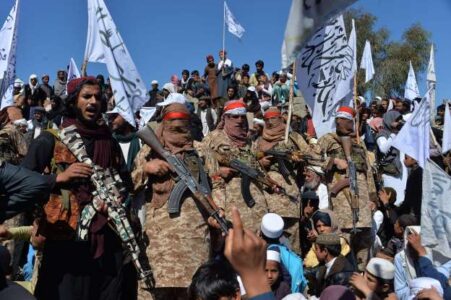
Taliban are already offering safe haven to Al Qaeda terrorists
A Pentagon watchdog on Tuesday reported that the Taliban was offering ‘safe haven’ to Al Qaeda, just a day after President Biden said the war in Afghanistan had succeeded in ensuring the country could not be used to launch attacks against the U.S.
The revelation will bring fresh questions about why Biden was intent on pushing through the U.S. withdrawal so fast.
And with U.S. troops and diplomats heading for the exits, who is left behind to provide intelligence on the deadly terrorist group?
The new report by the Lead Inspector General for Operation Freedom’s Sentinel – the name of the U.S. mission in Afghanistan – said terrorist networks including ISIS had made the most of the Department of Defense’s drawdown.
‘As the DoD restructured its counterterrorism mission to locations outside of Afghanistan, ISIS—Khorasan exploited the political instability and rise in violence during the quarter by attacking minority sectarian targets and infrastructure to spread fear and highlight the Afghan government’s inability to provide adequate security,’ it said.
‘Additionally, the Taliban continued to maintain its relationship with al Qaeda, providing safe haven for the terrorist group in Afghanistan.’
Osama bin Laden plotted the 9/11 terror attacks from Afghan soil, triggering the 2001 invasion by U.S. troops.
He was finally hunted down and killed by Navy Seals in neighboring Pakistan 10 years later.
Disrupting his network in Afghanistan has been a key part of the U.S. and NATO mission.
But with the Taliban retaking power, analysts are assessing what it means for Al Qaeda and the threat it poses to the West.
A peace deal signed by the Trump administration in Doha, the capital of Qatar, last year required the Taliban to stop giving safe haven terrorist groups.
Yet, the Taliban’s upper echelons are filled with figures who have fought alongside Al Qaeda or hosted their operatives. For example, Sirajuddin Haqqani, one of the Taliban’s deputy leaders and the son of a close friend to Bin Laden, is known to be a key conduit to the terror group.
As the Taliban advanced rapidly across Afghanistan, undoing billions of dollars of work that was meant to build a new democracy, officials have repeatedly seized on the eradication of Al Qaeda in the country as justification for leaving.
‘We went to Afghanistan almost 20 years ago with clear goals: get those who attacked us on September 11th, 2001, and make sure Al Qaeda could not use Afghanistan as a base from which to attack us again,’ said Biden on Monday, after being forced to leave Camp David to address the crisis.
‘We did that. We severely degraded Al Qaeda in Afghanistan.’
Other officials say they intent on holding the Taliban to the Doha deal.
‘We have a proven ability to fight terrorism effectively without having a large military footprint on the ground – and we will hold the Taliban accountable to not allowing Al Qaeda to have a safe haven in Afghanistan,’ National Security Adviser Jake Sullivan told ABC’s Good Morning America.
Terrorism experts scoff at the idea that the Taliban is no longer operating with Al Qaeda or that the terrorist group has been defeated.
‘The recent narrative of a degraded or defeated or decimated group – pick your D word, they’ve used – is delusional,’ said Bill Roggio, editor of the Long War Journal which tracks Al Qaeda activity in the region.
‘They’ve been there, operating alongside the Taliban the whole time. This narrative has persisted because the only way to pursue a US exit out of Afghanistan was to downgrade Al Qaeda’s presence.’
He said Pentagon assessments had long been works of fiction, putting the Al Qaeda presence at about 50-100 fighters – despite reporting that 40-80 operatives were being killed each year.
‘The intelligence services are clueless or lying,’ he said.
Roggio added that the chaotic departure of diplomats, contractors and troops – not to mention Afghans who had worked for the U.S. – would severely erode Washington’s ability to gather intelligence on Al Qaeda.
The Pentagon declined to comment on the report and instead directed inquiries to the White House and to the Pentagon Office of the Inspector General.
The White House did not immediately respond and a spokesman for the Pentagon Office of the Inspector General said it had nothing to add to the report.
A recent United Nations report said Al Qaeda’s leader Ayman al-Zawahiri was ‘living but ailing in Afghanistan.’
‘Al Qaeda is present in at least 15 Afghan provinces, primarily in the eastern, southern and south-eastern regions,’ it said. ‘Its weekly Thabat newsletter reports on its operations inside Afghanistan.’
And an offshoot, Al Qaeda in the Indian subcontinent operates under Taliban protection from Kandahar, Helmand and Nimruz Provinces.
In the aftermath of the Taliban takeover, Nathan Sales, former US ambassador-at-large, said Al Qaeda was one of the big winners.
‘The Biden administration’s withdrawal from Afghanistan is the best news Al Qaeda has had in decades,’ he wrote in a briefing paper for the Atlantic Council.
‘With the Taliban back in charge of the country, it is virtually certain that al-Qaeda will reestablish a safe haven in Afghanistan and use it to plot attacks on the United States.’
Source: Daily Mail





